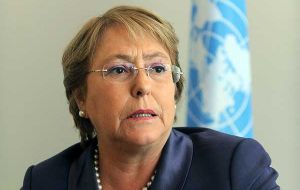MercoPress. South Atlantic News Agency
Bachelet calls for transitional measures to boost number of female lawmakers
 The former president has the best chances for running again in 2013
The former president has the best chances for running again in 2013 Chile should bring in “transitional measures” to boost the number of female lawmakers, said former President Michelle Bachelet, who heads the United Nations body charged with empowering women.
Citing the examples of Ecuador and Tunisia, and Uruguay in the next 2014 election, where parties are required to provide electoral lists that alternate male and female candidates, Bachelet said Chile and nations elsewhere in Latin America should use temporary measures like that to ensure more women are elected to parliament.
“Chile needs special transitional measures that will increase women’s political participation,” Bachelet said in an interview in Rio de Janeiro, where she’s attending the UN’s Rio+20 Conference on sustainable development. “If we really want more female participation in politics, you need to ensure that electoral laws are the right ones.”
Worldwide fewer than one in five lawmakers are women, and there are 17 or 18 female heads of state out of the UN’s 194 members, according to Bachelet. She served as Chile’s first female president from 2006 to 2010 and ensured her 22-member cabinet was split evenly between the sexes. About 14% of Chilean lawmakers are women, according to the UN.
She declined to comment on whether she would stand again for the Chilean presidency, saying only that she’s “fully dedicated to UN Women.”
However, opinion polls indicate that Bachelet remains the most popular and potential candidate for the 2013 presidential election.
Bachelet also said that women bring a different perspective to decision-making, and parliaments with more female lawmakers tend to pass more laws on social and environmental issues. Measures to boost their participation in parliament should only be long enough to eliminate inequality, she said.
“Democracy is not only about voting, it’s about being elected,” Bachelet said. “If we want to unleash the full potential of humanity, women’s potential should also be unleashed.”
One of the biggest barriers to women in politics is their traditional role as caregivers and public attitudes to women in the public sphere, according to the UN diplomat.
“In the majority of countries, the economy of care is the biggest obstacle: care for children, care for the disabled, care for the elderly falls on women’s shoulders,” Bachelet said. “Women have to make very difficult choices between the family and the public sphere -- professional work and politics. Usually they are punished by society and criticized if they abandon the family and are dedicated to public affairs.”




Top Comments
Disclaimer & comment rules-

-

-

Read all commentsBetter yet replace the current legislature with two women, a black , a cripple and a Jew. That should do it.
Jun 21st, 2012 - 10:38 am 0Canada ranked #1 for women, without female quota election laws.
Jun 21st, 2012 - 11:15 pm 0Reference:
Canada best G20 country to be a woman, India worst:
http://www.trust.org/trustlaw/news/special-coverage/g20women/
She is a stupid woman....Of course that the number of female lawmakers or better all kind of female workers must be increased in Chile but not by forced quaotas, just giving them more oportunities.
Jun 22nd, 2012 - 03:21 am 0Forcing quotas is humilliate them saying that they have not capabilities to do the work......what´s not true....with the except ion that conffirm the rule..... herself !!!!
Commenting for this story is now closed.
If you have a Facebook account, become a fan and comment on our Facebook Page!